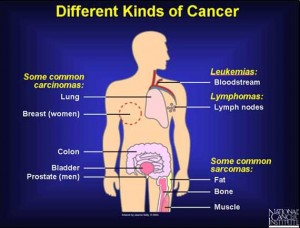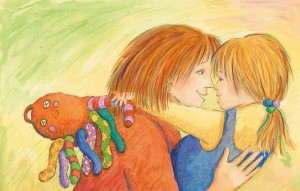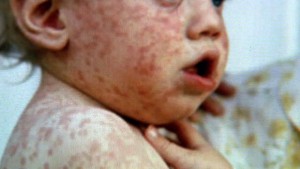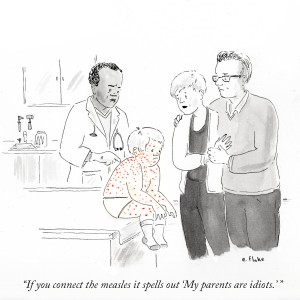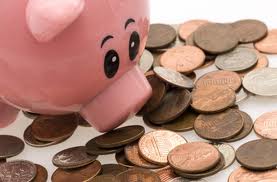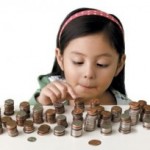One of the most common problems I encounter in the pediatric office, are problems with regards to bowel movements. It is very frustrating as a parent to see your baby, toddler or child in pain while trying to push out that stool. You just wish you could do something for them. Constipation can present as abdominal pain, skipping days of bowel movements (or weeks in extreme case) or even as diarrhea. In this article I will discuss the most common causes of constipation, how to treat it, and how to maximize everything you can do to prevent it from happening (again).
What is constipation?
Constipation is defined as having a bowel movement fewer than 3x a week. Often the stools will be dry and hard, but this does not always need to be the case. Stools come in all shapes and forms (just look at the picture; Types 4 and 5 are considered “normal”). In fact, in cases of really bad constipation stools can actually become quite liquid, and soiling may occur.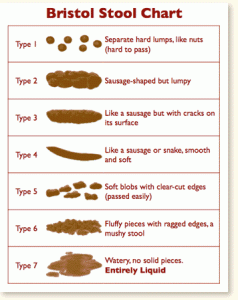
What are conditions/situations that make constipation appear most often?
Babies can have irregular bowel movements, and only have a bowel movement once every 4-5 days. As long as they are not bothered by it, that is ok. Some babies will have a bowel movement with every diaper change, some will skip 4 or 5 days.
When transitioning to solid feeds (often with the introduction of rice cereal) some babies may get constipated.
Another common time one can encounter constipation, is when your child is getting potty-trained. We are teaching them to hold their bowel movement until they reach their potty. Some kids love to have the power to hold their stools, and will try to hold it for as long as possible. Others are only inclined to have a bowel movement in their own home, and will hold it while at daycare, school or out camping. This ultimately leads to the most common vicious cycle in constipation: they will hold it, making the stool harder and bigger. When they do eventually have a bowel movement, it will cause them pain because it is too large. The next time they have to go to the washroom they will hold it even more because (like any human being) they do not want to experience pain again. This eventually turns into a vicious cycle, and at this point a doctor’s visit is often required to help resolve the constipation.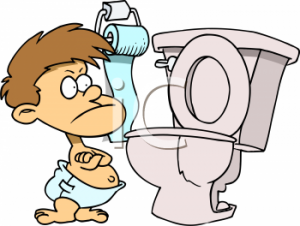
If one is prone to constipation, then a time when one is dehydrated (for example after a stomach flu with lots of vomiting and/or diarrhea) or when your child is hardly eating or drinking because they feel sick, could be the start of constipation.
All of these forms of constipation are called “habitual constipation”. There are also medical conditions that can cause constipation. These are rare, but in persistent cases of constipation, your primary care physician should rule them out and/or refer your child to a specialist. Again these are rare, but here is a list of some of the most common, rare causes: celiac disease (a gluten-allergy), hypothyroidism (thyroid is working too slow), Hirschsprungs disease (last part of intestine is missing nerves) and (exceedingly rare) Cystic Fibrosis (there is usually a family history of this, and many more other symptoms). With Hirschsprungs disease it will often manifest itself in the first week of life, when it will take very long for your baby to have their first bowel movement after birth (the so-called “meconium stool”). If your baby’s first meconium occurred > 48 hrs after birth, and they continue to suffer from constipation that is hard to treat, you should talk to your child’s physician about ruling out this disease.
How do we treat constipation?
If the constipation is mild and only started relatively recently, one can try diet modifications such as increasing fluid intake, eating prunes and/or drinking dilated prune or pear juice (1:1 ratio of prune/pear juice and water). In babies sometimes the old-fashioned trick of brown sugar-water can help (2 oz of water with 1 teaspoon of brown sugar). It is important to note that this should not be given daily. If these conservative measurements are not helping do not wait too long before seeking medical attention.
Your child’s physician may decide to prescribe a stool-softener which will basically attract water into the intestine, making the stool softer (for example lactulose liquid, or Polyethylene glycol powder also known as PEG3350). It is important to stress that one can NOT become dependent on these products.
On occasion it may be necessary to give your child enemas. These are typically given to children who are so full of stool, that they need to “get the cork out” in order to facilitate the rest of the stool to start moving.
“My child has a tendency to get constipated. Is there something I can do to prevent it from happening so often?”
Making sure the children are properly hydrated is by far the most effective way to prevent constipation. Ideally toddlers should drink at least 4 cups of water a day, and older children 6-8 cups of water a day. One of the contributing factors to constipation in toddlers is that they do not drink enough water in the first place. Some parents will put a tiny bit of juice in a cup, and then add lots of water and for some children that works. If that is not effective, sometimes a physician may give the kids a stool softener to help them.
Some parents might buy over-the-counter fibre products such as Benefibre or Metamucil. These products certainly provide extra fibre, however they only help treat the constipation if you drink even more water than your physician told you. This is often not possible for the kids. So, I do NOT recommend using these products. I suggest trying to encourage the kids to eat their fruits and vegetables to provide them with a natural source of fibre. The third step in preventing constipation is exercise. Luckily, most kids are very active so this is something that already occurs naturally.
Lastly, a regulated toilet regime can help your child prevent constipation. I suggest putting your child on the potty or toilet 3x a day for 5 minutes. If they produce, that is wonderful, if they don’t it is ok too. Typically about 15-20 minutes after a meal our bowels are most active. So for example, after breakfast, lunch and dinner would be a good time to put your child on the toilet/potty.
“My doctor/pharmacist told me to use a suppository to help with constipation”
It is true that glycerine suppositories can help getting some stool out of the rectum. I tend not to recommend them in most cases, for 2 main reasons: it only helps to get rid of the stool that is in the rectum (much more stool is left in rest of intestine), and sometimes you can create a small cut (also known as fissure) with the introduction of the suppository. Now your child or baby may experience pain again with a bowel movement, start holding the stool etc. Now we have actually created more problems than help with that suppository.
“My child has a bowel movement every day (albeit a bit hard); he cannot be constipated, can he?”
Oh yes, he can be constipated. The analogy I like to use for this is the accident in the tunnel. Imagine about 3/4 into a tunnel a traffic accident occurred and the 2-lane road has turned into a single lane (don’t worry, nobody got hurt). If you look at the entrance of the tunnel, you will see free-flowing traffic in 2 lanes going into the tunnel. However, if you are standing at the exit of the tunnel, you see cars coming out one by one, slowly in a single lane. Once the site of the accident in the tunnel has been cleared, there will be free-flowing traffic in the tunnel again. At no point did cars stop coming out of the tunnel, it was just slower and it took more time. With this kind of constipation, we need to help your child “clear the site of the accident” so to speak.
“Our doctor has already prescribed a stool softener, but it is not working”
This could indeed be the case, and then more vigorous treatments, possibly further investigations and/or referral to a specialist would be necessary. Alternatively, the dose of the stool softener prescribed was not high enough, or the stool softener was not used for an adequate amount of time.
Dr Raffi’s constipation tips:
1. Make sure your child drinks enough fluids, and eats their fruits and vegetables to provide sufficient fibre intake
2. Have a strict toilet regime
3. Don’t wait too long before seeking medical help (or restart previously prescribed stool softeners) in order not to get stuck in the vicious cycle of holding, experiencing pain and constipation.
4. If constipation persists despite all these therapies, talk to your child’s physician to rule out rare medical causes, and/or refer to a specialist Pediatrician or Pediatric Gastro-Enterologist
